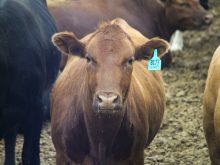China will draw up policies aimed at speeding up the transfer of rural land as part of efforts to improve efficiency and promote large-scale commercial farming, the government said Jan. 31.
The central government said in its “No. 1 document” for 2013, focusing on modernizing agriculture, it would grant more subsidies to large-scale landholders, family farms and rural co-operatives as it tries to provide more incentives to bring economies of scale to the fragmented countryside.
The “No. 1 document” is a key indicator of policy priorities and has focused on rural matters every year since 2003.
Read Also

Farming Smarter receives financial boost from Alberta government for potato research
Farming Smarter near Lethbridge got a boost to its research equipment, thanks to the Alberta government’s increase in funding for research associations.
“The development of China’s rural sector has entered a new stage along with the deepening industrialization and urbanization,” the government said in the document, which was published by the official Xinhua news agency.
It listed grain security and farm product supply as top priorities, with China seeking to boost production as it urbanizes and industrializes. The relocation to the cities of more than 200 million migrant workers has slashed the rural workforce and boosted food demand, leading to a growing dependence on imports.
The government will continue to support domestic farm prices by increasing state stockpiles, it said. The policy has sent domestic prices much higher than international levels, requiring even tighter regulations of imports.
The government will continue to purchase and stockpile corn, soybeans, rapeseed, cotton and sugar while strengthening the import tariff and quotas system, it said, without giving details.
China would also draw up measures to stimulate agriculture commodity futures trading and introduce new futures products. The government provided no details in the document.
The government will strengthen monitoring on imports of “sensitive” farm products and crack down on smuggling, it said, without elaborating.
Land transfers
Consolidating land under the control of larger commercial farms has remained a big challenge for the government, with a large number of leaseholders still unwilling to give up the safety net that their small farms provide.
The government is concerned that allowing large-scale land transfers will enable authorities to sell more scarce farmland to profitable non-agricultural sectors. It also fears a rising tide of rural unrest in the face of land grabs and pollution from heavy industry.
The government aims to improve the land registration system in the coming years to “offer legal proof to farmers in cases of land transfers,” it said in the document.
Farmers in China do not directly own most of their fields. Instead, most rural land is owned collectively by a village, and farmers get leases that last for decades.
In theory, the villagers can collectively decide whether to apply to sell off or develop land. In practice, however, local governments usually decide land sales and get the bulk of revenues.
Chinese academics have long called for land system reforms to permit direct land transfers by farmers.
Food security has long been a preoccupation of the ruling Communist Party, but imports last year accounted for about 12 per cent of total food supplies and senior officials have already ruled out self-sufficiency as an option.
But the government has remained reluctant to endorse large-scale imports, and the government is also expected to promise to better regulate trade.














